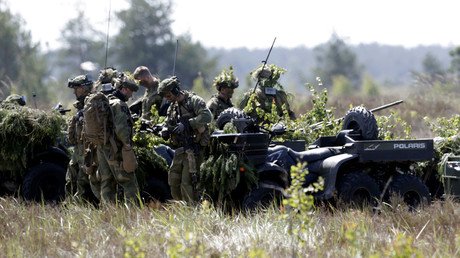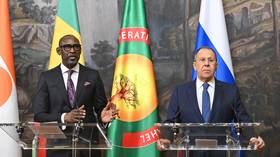NATO ignores terror threat coming from south, demonizes Russia instead – Moscow
NATO “exists in a political mirror-world,” focusing on a “mythical” threat from the East “demonizing” Russia, Foreign Ministry spokeswoman Maria Zakharova said commenting on the results of the bloc’s summit in Warsaw.
“We’re currently analyzing the decisions made at the NATO summit that took place in Warsaw on July 8 and 9. But even a cursory look at the results of the meeting shows that NATO continues to exist in some political mirror-world,” an official statement from Zakharova reads.
READ MORE: NATO missile defense goes live in Europe, isolating Russia not the goal – Stoltenberg
The summit ended on Saturday with the allies signing a 139-chapter communiqué on measures to tackle security threats, with "Russian aggression” being one of the core points. NATO accused Russia of “provocative military activities in the periphery of NATO territory” and “willingness to attain political goals by the threat and use of force.” The alliance slammed Moscow’s actions as “a source of regional instability, fundamentally challeng[ing] the alliance, hav[ing] damaged Euro-Atlantic security, and threaten[ed] our long-standing goal of a Europe whole, free, and at peace.”
“Contrary to the aspirations of maintaining peace and stability in Europe, the Alliance focuses on ‘deterring’ a non-existent ‘threat from the East’,” Zakharova said noting that the allies’ attempts to strengthen their flanks in Europe to confront Russia would be better placed tackling the unprecedented levels of terrorist threats coming from a southerly direction.
“Attempts to ‘demonize’ Russia in order to justify the steps taken in the field of military construction, to divert public attention from the destructive role of the alliance and some of its allies, who provoke crises and […] hotbeds of tension in various parts of the world, has become increasingly tumid.
The stark imbalance in strengthening NATO's flanks [in the East] against the background of unprecedented levels [of terror threat] coming from the South [shows] the apparent isolation of the block’s policy from real need for protection and security of NATO member states’ citizens,” the spokeswoman said.
'Russia threat is bombast': Brian Becker on NATO summit https://t.co/eCyENPi1O1pic.twitter.com/dc2l8wXq4o
— RT (@RT_com) July 9, 2016
NATO Secretary General Jens Stoltenberg on Friday announced the alliance’s ballistic missile defense system in Europe is now operational. The system includes warships, long-range missile defense interceptors and radars placed across the territory controlled by the allied forces. While Stoltenberg claimed that the shield is “entirely defensive” and “represents no threat to Russia's strategic nuclear deterrent,” Mikhail Gorbachev, the former Soviet statesman and the last leader of the Soviet Union, says despite such assurances NATO seems to be prepping for war.
“The rhetoric in Warsaw screams of an intention to practically declare war on Russia. They only talk about defense, but in fact they are preparing an offensive,” the former Soviet leader told Interfax.
One of the key results of the Warsaw summit was the long-debated deployment of four additional NATO battalions to the Baltic States. NATO says the deployment is necessary to prevent a possible attack from Russia and reassure Eastern European nations that other members are committed to defend them. And though Stoltenberg said Russian authorities will be briefed on this plan, as well as other decisions that were made at the summit, Zakharova states Moscow will seek a thorough explanation at the upcoming Russia-NATO Council.
“We expect a detailed explanation from the permanent representatives of the NATO alliance on all developments in all directions at the upcoming regular meeting of the Russia-NATO Council on July 13. In the context of the declared ‘peace-loving aspirations’ of the bloc we will also look forward to the alliance's position on the initiative of our Finnish partners, the so-called 'Niinistö plan' aiming to improve aviation safety in the Baltic Sea,” Zakharova concluded.














